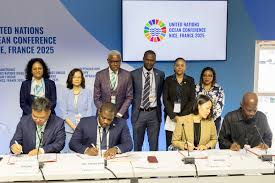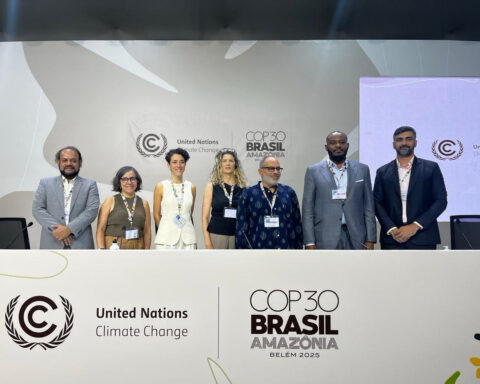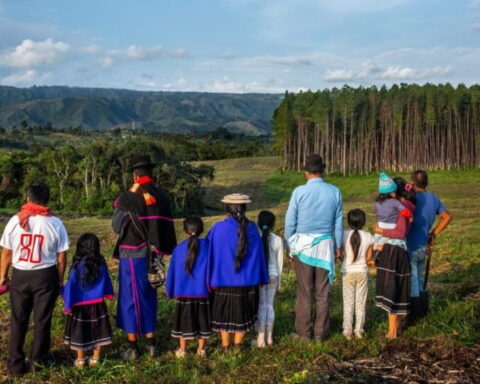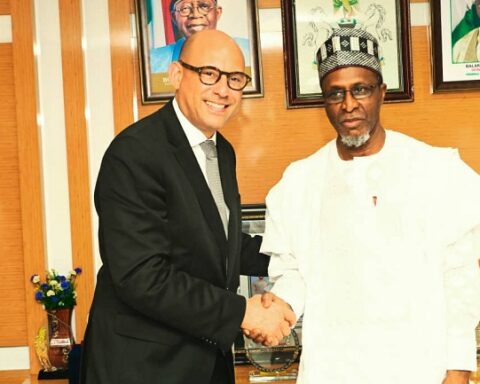The 2025 United Nations Ocean Conference has ended on a historic note, with over 170 countries adopting a robust political declaration titled “Our ocean, our future: united for urgent action,” a global call to conserve and sustainably use the ocean.
While the commitments made are groundbreaking, African countries like Nigeria must now translate global pledges into national action to protect their coastal ecosystems and blue economies.
At the heart of the five-day conference was the unveiling of the Nice Ocean Action Plan, combining an intergovernmentally agreed declaration with bold voluntary commitments aimed at tackling marine pollution, expanding marine protected areas (MPAs), decarbonizing shipping, and unlocking billions in financing for climate-vulnerable nations.
United Nations Under-Secretary-General for Economic and Social Affairs, Li Junhua, emphasized the urgency: “Pledges made this week must be rigorously implemented, tracked, and scaled… and must translate into decisive national action.”
Global Commitments That Could Benefit Nigeria
Among the standout pledges was France’s Polynesian territory, which will establish the world’s largest marine protected area, covering over 5 million square kilometres.
Closer to home, New Zealand’s $52 million commitment to Pacific Island ocean governance and Canada’s $9 million pledge to build resilience in Small Island Developing States offer models and potential partnerships for Nigeria and the broader Gulf of Guinea.
Germany’s €100 million clearance of legacy munitions and Italy’s €6.5 million real-time satellite surveillance for marine oil spill detection could serve as critical blueprints for countries like Nigeria, where oil spills in the Niger Delta remain a major environmental and public health crisis.
For Nigeria, where marine pollution, illegal fishing, and oil-related environmental degradation are endemic, these global initiatives highlight both a challenge and an opportunity: to reposition ocean governance as a national development and climate priority.
African Voice: The Need for Blue Justice and Climate Finance
Despite Africa’s limited contribution to oceanic carbon emissions, its coastal populations are among the most vulnerable to sea-level rise, overfishing, and marine biodiversity loss. From Lagos to Lamu, and from the Bight of Benin to the Somali coast, millions depend on the ocean for livelihoods.
However, three-quarters of Africa’s ocean-related climate finance needs remain unmet, and over half of the support arrives as debt.
As global partners launch financing tools like Indonesia’s Coral Bond and the One Ocean Finance co-design initiative, African negotiators have called for grant-based, not loan-based, financing that prioritizes nature-based solutions and local communities.
In what many experts consider the most legally significant milestone of the conference, 19 more countries ratified the Biodiversity Beyond National Jurisdiction (BBNJ) Agreement, and 20 others signed it, bringing the treaty closer to entry into force.
With 50 ratifications now confirmed, 10 short of the threshold, this legally binding treaty aims to protect marine life in the high seas, covering two-thirds of the world’s ocean.
Yet, Nigeria is not yet a ratifying party, even though it holds influence within the Gulf of Guinea Commission and the African Union’s Blue Economy strategy.
Experts say non-participation in the BBNJ Agreement could leave the country sidelined in future governance and resource access decisions in international waters.
Nigeria’s Role and the Urgent Need for a National Ocean Action Plan
While many African countries attended the conference, Nigeria’s absence from key voluntary commitments raised eyebrows among regional ocean advocates. The country, which boasts over 850 kilometres of Atlantic coastline, is facing increased challenges: overfishing, rising sea levels affecting coastal cities like Lagos, and an under-regulated offshore oil sector.
Speaking to DA News, Dr. Tunde Ajani, an ocean governance expert based in Abuja, warned: “If Nigeria fails to develop a national Ocean Action Plan aligned with the global framework, it will miss both the environmental benefits and the billions in blue economy financing.”
A robust national plan would align with the African Union’s 2063 Agenda and integrate community-led MPA expansion, maritime security, decarbonization of oil and gas infrastructure, and engagement with international treaties like the BBNJ.
Way Forward: An Ocean of Opportunity
The conclusion of the UN Ocean Conference offers a defining moment. From Canada’s $9 million nature-based solutions fund to Panama and Canada’s Quiet Ocean coalition tackling marine noise pollution, the global south is not only watching it’s acting.
The message from Nice is clear: action must be immediate, inclusive, and irreversible.
As the world looks to COP30 in Brazil, Nigeria, and other African nations must turn momentum into mandates. The ocean is not just a resource, it’s a lifeline. And for Nigeria, protecting it is no longer optional; it’s essential for survival, sovereignty, and sustainable development.
By Dare Akogun








